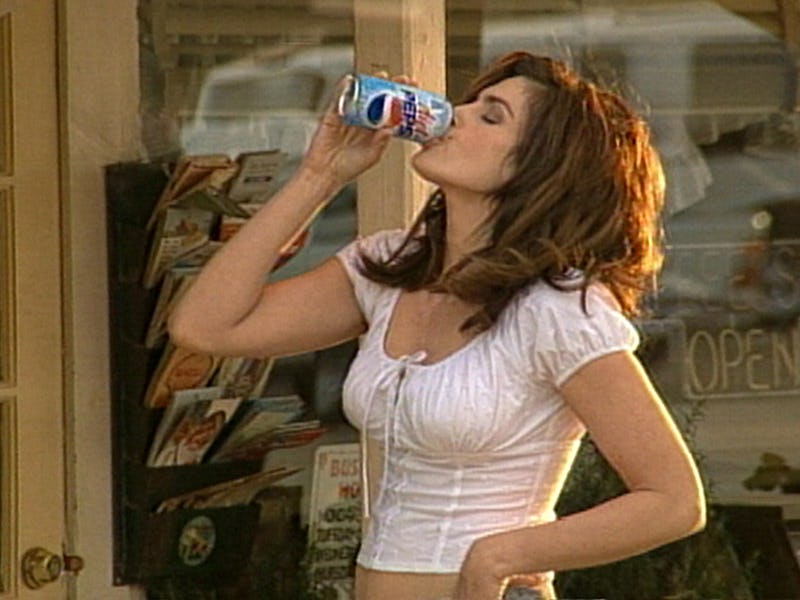WTF Is Aspartame and Why Is Pepsi Bringing Back the Chemical Linked to Cancer?
The much maligned artificial sweetener is coming back.

“Oh, I dont ‘do’ aspartame, it causes cancer,” has been the line on the sweetener ever since a 2005 study made links between consumption of the chemical and increased rates of cancer in lab rats. There’s pretty much nothing worse than to have the consumption of your product linked to the Big C.
In an effort to battle that poor public opinion and to address what Pepsi executive Seth Kaufman said was the “Number 1 thing” customers had been complaining about, Pepsi removed the sweetener from its product lineup in August of 2015.
Now, less than a year later, in an attempt to curb plunging sales, Pepsi is bringing back a low-calorie aspartame-sweetened option as first reported by industry newsletter Beverage Digest.
The three flavors of Diet Pepsi when they bring aspartame back to the lineup.
Not to be accused of lacking options, the new aspartame-full Diet Pepsi to be unveiled in September, will bring the company’s total of diet flavors to three. The company wants to keep its flagship Diet Pepsi clear from any potential negative associations, so the new aspartame-enriched beverage will be called Diet Pepsi Classic Sweetener Blend (a much better name than Diet Tastes Good and Definitely Doesn’t Cause Cancer) and will come in a light blue can. The aspartame free option, sweetened with sucralose and acesulfame K since 2015, will keep the simple Diet Pepsi moniker and be packaged in the same silver can. To round it out, Diet Pepsi Max, an energy soda for the weight conscious, will be reintroduced in the U.S. as Pepsi Zero Sugar. It will be packaged in its familiar black can, and will still contain aspartame.
“Consumers want choice in diet colas, so were refreshing our U.S. lineup to provide three options that meet differing needs and taste preferences,” Pepsi announced Monday. Yeah, that’s kind of an understatement.
These changes, as well as the original 2015 decision to cut out aspartame, are aimed at bringing consumers back to a diet soda market that’s struggled mightily in recent years. The company’s original experiment did little to alter sales, and this reversal may not work either. According to research by Nielsen consumers have bought considerably less soda, diet or otherwise, than each year previous since 2013. What they have bought more of is sparkling water. The health conscious who once moved from regular to diet, seem to be moving on from drinking soda altogether, whether or not it gives rats brain tumors.
What Is Aspartame, Exactly?
The chemical sweetener was first synthesized in 1965 by James M. Schlatter. He was working for the G. D. Searle & Company, now a subsidiary of Pfizer, and trying to develop a chemical to help test the effectiveness of anti-ulcer drugs. He discovered the sweetness of the compound when he licked the tip of his finger covered in the substance in preparation to turn a page. Final approval for use of the product in food didnt come until 1981, and leading up to and since then, aspartame, sold under trade names such as NutraSweet and Equal, [is] one of the most thoroughly tested and studied food additives the agency has ever approved, according to the FDA.
Aspartame, according to the FDA, is “a low-calorie sweetener, composed primarily of two common amino acids, aspartic acid and phenylalanine. Each of these is also a building block for conventional foods such as protein and natural flavor molecules.” But because the chemical breaks down in the body to sub-compounds including phenylalanine, it can truly be a danger to people suffering from a rare condition called phenylketonuria. The condition prevents sufferers from being able to metabolize the amino acid and can make the sweetener poisonous. Short of having this condition, multiple FDA tests and studies have shown that in the volumes regularly ingested, this popular sweetener poses no health risk to the general populace. One study found that in order for the compound to pose a risk to humans at all, a person would have to drink the equivalent of eight to 21 cans of diet soda daily. Which is only slightly more than some of us have.
Molecular makeup of aspartame.
Schlatters accidental food compound is 200 times sweeter than normal table sugar. Though its caloric profile is similar to the plant-based sweetener, much less of it is needed to get a similar flavor profile. A moment on the lips is not a lifetime on the hips, and the chemical is one of the most popular artificial sweeteners on the market. This popularity accounts for Pepsi Co’s latest decision. As the Associated Press reports, the company’s decision to bring back the sweetener was based in part on consumer demand for the taste.